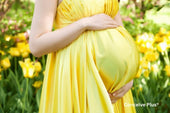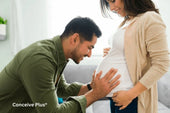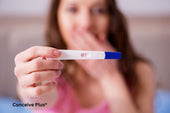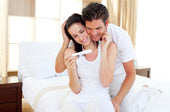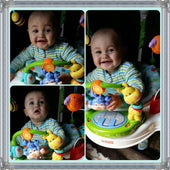What Is the Best Time to Have Sex for Conception?

A woman is not always fertile in her reproductive age, unlike a man. It is only a few days in her monthly reproductive cycle or menstrual cycle when she can conceive successfully. This is because a woman's body releases an egg only once, during the ovulation phase of the menstrual cycle.
But, when is ovulation? How can a woman determine her fertile days? When is the best time to have sex when trying to conceive?
In this article, we will study why, as a woman, you can only conceive on specific days during your cycle, how you can detect those days, and when should you have sex for maximum possibility of conception.
How Ovulation Is Important for Conception?
Ovulation is that event in your menstrual cycle when an ovary releases a mature egg [1]. This egg travels down the fallopian tube, where it waits for sperm for fertilization. Ovulation usually happens about 14 days before the start of your next period in a 28 day cycle. However, the exact day can vary depending on the cycle length and regularity.
Reports show that a female egg is only viable for 12 to 24 hours after ovulation [2]. This makes it critical to plan sex around the days of ovulation for fertilization and conception. Fortunately, sperm can survive in the female reproductive system for up to five days [2]. While considering factors like sperm survival, some may wonder how many drops of sperm is needed to get pregnant. This fertility window spans about six days each month, which includes 5 days before ovulation and the day of ovulation itself.
How to Identify Your Fertility Window?
Most women already know that the fertility window is the best time to have intercourse when trying to conceive. The question they ask is, how can they identify their fertility window or their most fertile days?A woman can identify her most fertile days by tracking her ovulation.
Here are some effective methods to track ovulation:
- Basal Body Temperature (BBT): When a woman ovulates, her basal body temperature increases noticeably [3]. You can measure your temperature every morning before getting out of bed to identify the day when it rises. This way, you can pinpoint your ovulation day and identify your fertility window.
- Ovulation Predictor Kits (OPKs): A convenient way to detect ovulation is by using an ovulation predictor kit. These tests detect a rise in luteinizing hormone (LH) in your urine that occurs 24 to 36 hours before ovulation [4].
- Cervical Mucus Monitoring: Cervical mucus is a fluid produced by glands in the cervix. On other days of your menstrual cycle, the cervical mucus stays thick and sticky. However, during ovulation, cervical mucus becomes clear, stretchy, and slippery, resembling egg whites.
- Ovulation Calendar: If your cycles are regular, calculate your ovulation day by counting 14 days backwards from the start of your next period. You can also use an online ovulation calculator for assistance.
Tips to Increase Chances of Conception
One way to increase your chances of conception is to identify your most fertile days and plan intercourse on those days. But it is not the only factor that decides your conception. Here are some other contributing factors that can help you maximize your chances of conception:
-
Have Regular Intercourse
Aim to have sex every two to three days throughout your cycle. This ensures fresh sperm is always available in the female reproductive system. Increase the frequency on your most fertile days since reports show that couples who perform daily intercourse on their most fertile days have a higher success rate [5].
-
Use Fertility-Friendly Lubricants
If you use lubricants, ensure they are sperm-friendly. Some lubricants can inhibit sperm movement, lowering the chance of sperm reaching the egg. If you are looking for conception-friendly lubricant, Conceive Plus Fertility lubricant is an excellent choice, with 99% proven results.
-
Maintain a Healthy Lifestyle
A healthy diet and lifestyle significantly contribute to the fertility of both men and women. Both partners should eat a balanced diet, exercise regularly, and avoid smoking or excessive alcohol consumption.
-
Manage Stress
High levels of stress can interfere with ovulation in the female partner and sperm quality in the male partner. Practice relaxation techniques like yoga or meditation to reduce stress and boost fertility health.
-
Consider Fertility Supplements
Both partners should consult their doctor about taking fertility supplements if they suspect their fertility health isn't optimum, which is common [6]. Fertility supplements for men support healthy sperm formation, while fertility supplements for women improve female egg quality. These supplements also help address many fertility issues in males and females.
-
Seek Medical Advice
If you’ve been trying to conceive for a year, or six months if you’re over 35, without success, it is recommended to consult a healthcare provider. This helps rule out underlying fertility issues and get effective treatment.
Conclusion
If you were confused about when is the best time to have sex or when can you have sex for conception, now you know it is your fertility window when your chances of conception are maximum. Your fertility window comprises 5 days before ovulation and the day of ovulation.
You must plan regular unprotected sex and work on other aspects like a healthy diet and lifestyle to get pregnant. If you still struggle to conceive, it is a good idea to talk to a fertility specialist for expert advice.
Resources Used
- Holesh, J. E., Bass, A. N., & Lord, M. (2023c, May 1). Physiology, ovulation. StatPearls - NCBI Bookshelf. https://www.ncbi.nlm.nih.gov/books/NBK441996/
- Pregnancy - identifying fertile days: MedlinePlus Medical Encyclopedia. (n.d.-b). https://medlineplus.gov/ency/article/007015.htm
- Basal body temperature for natural family planning - Mayo Clinic. (n.d.). https://www.mayoclinic.org/tests-procedures/basal-body-temperature/about/pac-20393026
- Ovulation home test: MedlinePlus Medical Encyclopedia. (n.d.). https://medlineplus.gov/ency/article/007062.htm
- Levine, H. (2023, June 21). How often should you have sex to get pregnant? BabyCenter. https://www.babycenter.com/getting-pregnant/how-to-get-pregnant/can-having-too-much-sex-affect-our-chances-of-conception_6145
- How common is infertility? (2018, February 8). https://www.nichd.nih.gov/. https://www.nichd.nih.gov/health/topics/infertility/conditioninfo/common







